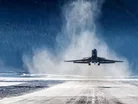COVID-19 and the future of pilot training

United Airlines became the latest carrier to announce that they’ve had to postpone a new pilot training class this week.
Many other airlines are likely to cut their future flying capacity significantly over the next six months. While these moves are an understandable response to the COVID-19 outbreak, as demand reduces for pilots in the short term, the long-term picture will be vastly different. In China, for example, where domestic routes are the first to be restarted, International flights will follow in time, and airlines will return to facing a significant shortage of readily available pilots, hindering the industry’s ability to bounce back with alacrity from this setback.
This means flight simulators are now set to play their most essential role yet in aviation training. They are already vital in keeping more experienced crews sharp, but with airlines grounded, the need for simulator training for qualified pilots will increase as airlines seek to get their fleet back in the air. Flying really is just like any other skill, it needs to constantly practised so the highest possible levels can be maintained. Recency rules do already exist around flying for this reason, where pilots who operate aircraft carrying passengers must have carried out a certain amount of take-offs, approaches and landings in months prior to their flight. These will be impossible for the industry to keep to during this period without the use of simulators.
In this climate, simulators offer a route for pilots to both train and hone their skills in a practical and realistic way. Most simulator training for experienced pilots revolves around creating scenarios where something has gone wrong and the team must work together to resolve it. For pilots, who treat the simulator experience as if it were a real flight, these exercises are essential to maintain safety standards while dealing with rare or unforeseen circumstances.
SEE ALSO:
At Alpha Aviation, we invested recently in a new Alsim-AL172 flight simulator. These already offer our industry high efficiency when it comes to training as they are useful for cutting operational costs, such as fuel use. In the current circumstances though, I would not be surprised to see simulator training become mandated before many pilots return to work to make sure they are ready after a substantial break from flying.
Alongside these measures, we must now also turn to simulator training while so many planes are grounded to keep training the pilots that will be needed to meet demand when it returns. With safety at the forefront of modern training, simulators offer us a unique chance to give complete training to cadets, while recreating multiple training scenarios that guarantee effective aircraft operation.
Modern advancements mean pilot training providers can recreate the flying experience and effectively bridge the gap between theory and reality. The AL172 features two aircraft cockpit seats, Cessna 172 specific interior cockpit and a flight deck. It will be vital in assisting us with pilots who are training to enhance their skills, while keeping one eye on the horizon of the huge opportunities that will be available to them in just a few short years when air travel returns.
Bhanu Choudhrie is the founder of Alpha Aviation Group, one of the world's leading pilot training providers. It is headquartered in London with flight schools in the Philippines and the UAE.
Tags
aviation- Singapore Airlines names first female CFO: 10 things to knowLeadership & Strategy
- Who is Vanessa Hudson, the first female CEO of Qantas?Leadership & Strategy
- Who is likely to replace Qantas CEO Alan Joyce?Leadership & Strategy
- Meet the CEO: IIker Ayci to helm Tata Sons’ Air IndiaLeadership & Strategy



